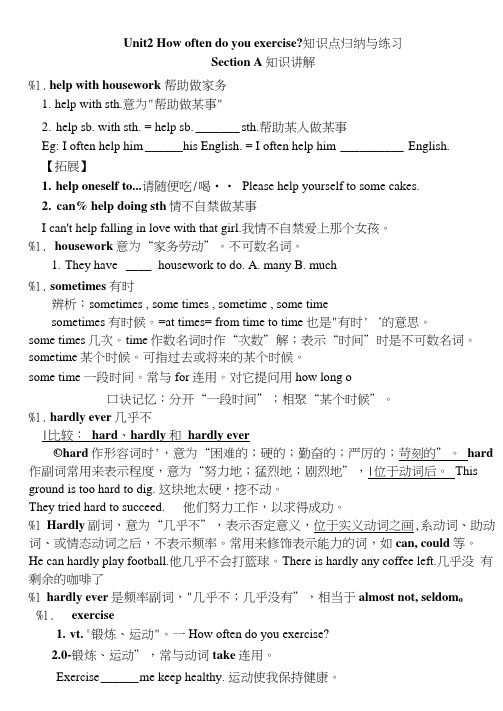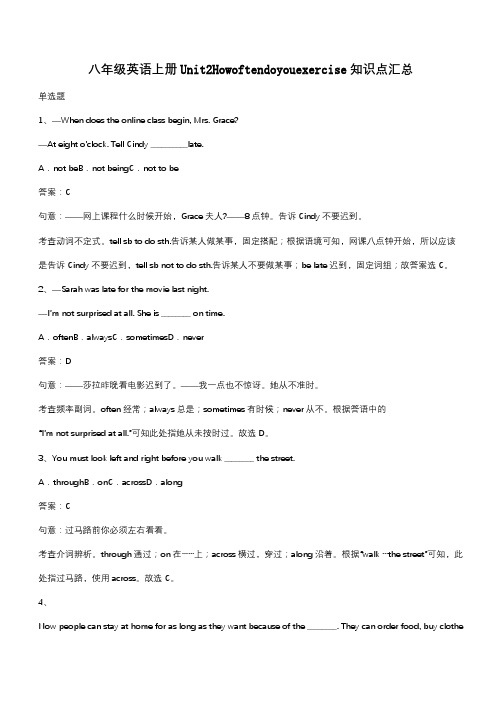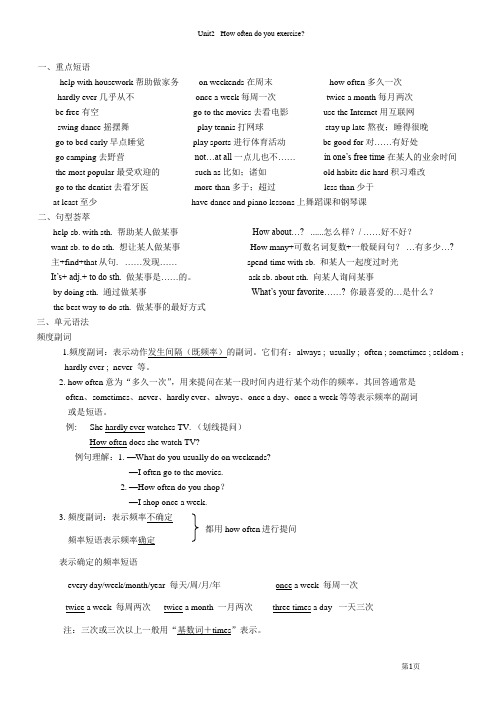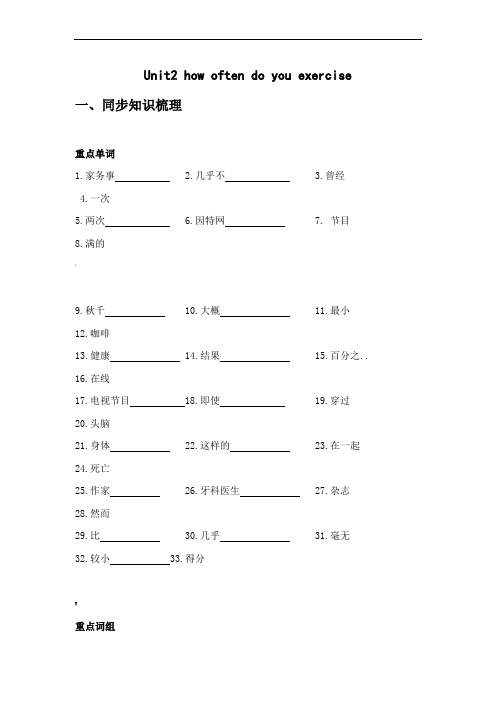Unit2 How often do you exercise知识点归纳与练习
- 格式:doc
- 大小:72.00 KB
- 文档页数:6

Unit2 How often do you exercise?知识点归纳与练习Section A知识讲解%1.help with housework 帮助做家务1.help with sth.意为"帮助做某事"2.help sb. with sth. = help sb. _______ sth.帮助某人做某事Eg: I often help him ______ h is English. = I often help him __________ English.【拓展】1.help oneself to...请随便吃/喝•• Please help yourself to some cakes.2.can% help doing sth情不自禁做某事I can't help falling in love with that girl.我情不自禁爱上那个女孩。
%1.housework意为“家务劳动”。
不可数名词。
1.They have ____ housework to do. A. many B. much%1.sometimes 有时辨析:sometimes , some times , sometime , some timesometimes 有时候。
=at times= from time to time 也是"有时'‘的意思。
some times几次。
time作数名词时作“次数”解;表示“时间”时是不可数名词。
sometime某个时候。
可指过去或将来的某个时候。
some time 一段时间。
常与for连用。
对它提问用how long o口诀记忆:分开“一段时间”;相聚“某个时候”。
%1.hardly ever几乎不|比较:hard、hardly 和hardly ever©hard作形容词时',意为“困难的;硬的;勤奋的;严厉的;苛刻的”。

unit2howoftendoyouexercise复习知识点在复习知识点“Unit 2: How often do you exercise”时,有几个主要的方面需要着重复习。
这些方面包括谈论运动频率、谈论运动类型以及表达个人的运动习惯。
以下是一个1200字以上的复习内容:此外,我们还可以谈论不同的运动类型。
在英语中,有各种各样的运动类型,让我们可以选择适合自己的运动方式。
一些常见的运动类型包括健身运动(exercise)、跑步(running)、游泳(swimming)和打篮球(playing basketball)。
在讨论中,我们可以说,“I like to do exercise to keep fit”(我喜欢锻炼以保持健康)或者“I enjoy swimming as it is a great way to relax”(我喜欢游泳,因为它是一个很好的放松方式)。
同时,我们还可以使用一些表达来表达对特定运动的喜好或不喜好。
例如,我们可以说,“I love playing football. It's my favorite sport”(我喜欢踢足球。
这是我最喜欢的运动)或者“I do n't enjoy cycling. It's not my thing”(我不喜欢骑车。
这不是我的菜)。
除了运动频率、运动类型和个人运动习惯之外,我们还可以讨论一些与运动相关的话题,比如运动对健康的益处、如何建立健康的生活方式以及给予他人运动建议等等。
在这些话题中,我们需要使用适当的动词、名词和形容词来表达自己的观点和建议。
总之,复习知识点“Unit 2: How often do you exercise”是学习英语时非常重要的一步。
通过复习运动频率、运动类型和个人运动习惯的表达方式,我们可以更好地描述自己的运动习惯,并与他人交流讨论。
同时,我们还可以进一步讨论与运动相关的话题,以扩展我们的知识和表达能力。

Unit2 How often do you exercise?一、单词(标注二音节重读的单词)1.n.家务劳动2.adv.几乎不;简直不;刚刚3.adv.曾经;在任何时候4.adv.一次;曾经5.adv.两倍;两次6.n.因特网7.n.节目;程序;课程;节目单8.adj.满的;充满的;完全的9.n.摇摆;秋千 v.摇摆;旋转10.adv.或许;也许;可能11.摇摆舞12.adj.最小的;最少的13.至少14.很少;几乎从不;难得15.n.垃圾;废旧杂物16.n.咖啡;咖啡色17.n.健康;人的身体或精神状态18.结果;后果19.adj.百分之 ... 的20.adj.在线的 adv.在线地21.n.电视机;电视节目22.conj.虽然;尽管;然而;可是23.prep.穿过;凭借;一直到24.n.身体25.头脑;想法;意见;心思26.adj.这样的;如此的27.adv.共同;一起28.v.死;枯竭;消失29.n.作者;作家30.V.写、写作31.n.牙科医生32.n.杂志33.adv.然而;无论如何;不管多么34.conj.比35.adv.几乎;差不多36.pron.没有人;没有任何东西,毫无37.adj.更少的;较少的38.n.看法;要点;重点;小数点;目标;分数39.例如;诸如40.n.垃圾食品;无营养食品41.超过;多于;不仅仅;非常42.不到;少于二、短语1.帮助做家务2.在周末3.多久一次4.几乎从不5.每周一次6.每月两次7.每天8.有空9.去看电影10.用互联网11.摇摆舞12.打网球13.熬夜;睡得很晚14.至少15.上舞蹈课和钢琴课16.早点睡觉17.进行体育活动18.对……有好处19.去野营20.一点儿也不……21.在某人的业余时间22.最受欢迎的23.比如;诸如24.积习难改25.去看牙医26.多于;超过27.少于28.帮助某人做某事29. ......怎么样?/ ……好不好?30.想让某人做某事31.和某人一起度过时光32.对于某人来说做某事的……的33.某人发现做某事是......的34.向某人询问某事35.通过做某事36.你最喜爱的……是什么?37.(最喜欢的 = )38.做某事的最好方式三、重点句式1.在周末你通常做什么?2.你多久去一次电影院?3.我每个月去一次电影院?4.为什么?四、语法一. Help用法(4点)二.意为“家务劳动”。

八年级英语上册Unit2Howoftendoyouexercise知识点汇总单选题1、—When does the online class begin, Mrs. Grace?—At eight o'clock. Tell Cindy __________late.A.not beB.not beingC.not to be答案:C句意:——网上课程什么时候开始,Grace夫人?——8点钟。
告诉Cindy不要迟到。
考查动词不定式。
tell sb to do sth.告诉某人做某事,固定搭配;根据语境可知,网课八点钟开始,所以应该是告诉Cindy不要迟到,tell sb not to do sth.告诉某人不要做某事;be late迟到,固定词组;故答案选C。
2、—Sarah was late for the movie last night.—I’m not surprised at all. She is ________ on time.A.oftenB.alwaysC.sometimesD.never答案:D句意:——莎拉昨晚看电影迟到了。
——我一点也不惊讶。
她从不准时。
考查频率副词。
often经常;always总是;sometimes有时候;never从不。
根据答语中的“I’m not surprised at all.”可知此处指她从未按时过。
故选D。
3、You must look left and right before you walk ________ the street. A.throughB.onC.acrossD.along答案:C句意:过马路前你必须左右看看。
考查介词辨析。
through通过;on在……上;across横过,穿过;along沿着。
根据“walk…the street”可知,此处指过马路,使用across。
故选C。
4、Now people can stay at home for as long as they want because of the ________. They can order food, buy clothes, have classes, ect.A.worldB.InternetC.supermarketD.restaurant答案:B句意:现在因为有了互联网,人们想待在家里多久就待多久。

一、重点短语help with housework 帮助做家务 on weekends 在周末 how often 多久一次hardly ever 几乎从不 once a week 每周一次 twice a month 每月两次be free 有空 go to the movies 去看电影 use the Internet 用互联网swing dance 摇摆舞 play tennis 打网球 stay up late 熬夜;睡得很晚go to bed early 早点睡觉 play sports 进行体育活动 be good for 对……有好处go camping 去野营not…at all一点儿也不……in one’s free time在某人的业余时间the most popular 最受欢迎的 such as 比如;诸如 old habits die hard 积习难改go to the dentist 去看牙医 more than 多于;超过 less than 少于at least 至少 have dance and piano lessons 上舞蹈课和钢琴课二、句型荟萃help sb. with sth. 帮助某人做某事How about…? ......怎么样?/ ……好不好?want sb. to do sth. 想让某人做某事 How many+可数名词复数+一般疑问句?…有多少…?主+find+that从句. ……发现…… spend time with sb. 和某人一起度过时光It’s+ adj.+ to do sth. 做某事是……的。
ask sb. about sth. 向某人询问某事by doing sth. 通过做某事What’s your favorite……?你最喜爱的…是什么?the best way to do sth. 做某事的最好方式三、单元语法频度副词1.频度副词:表示动作发生间隔(既频率)的副词。

Unit2 how often do you exercise一、同步知识梳理重点单词1.家务事2.几乎不3.曾经4.一次5.两次6.因特网7. 节目8.满的)9.秋千 10.大概 11.最小12.咖啡13.健康 14.结果 15.百分之..16.在线17.电视节目 18.即使 19.穿过20.头脑21.身体 22.这样的 23.在一起24.死亡25.作家 26.牙科医生 27.杂志28.然而29.比 30.几乎 31.毫无32.较小 33.得分?重点词组1.2.几乎不 2.摇摆舞3.至少4.垃圾食品5.例如6.多于7.少于重点句型1.What do you usually do on weekends;I always exercise.2.What does she do on weekendsShe sometimes goes shopping.3.How often do you you go to the moviesI go to movies maybe once a month.Section Aoften do you exercise 你多久做一次运动—【解析1】how often/ how long / how far/ how soon辨析》【解析2】exercise v 锻炼=do sports= play sports【短语】take /have/do exercise 做运动 do morning exercise 做早操 do eye exercise 做眼保健操2.3.What do you usually do on weekends 你在周末做什么【解析1】频度副词【注】:频度副词表示多长时间做某事一次, 用在实义动词之前,系动词、助动词、情态动词之后。
We often clean the classroom every day. 【拓展】some time /sometime/some times/sometimes 【口诀】:分开是一段,合起是某时; 分开s 是倍次,合起s 是某时 (1)some time 一段时间,做时间状语 ;It takes sb. some time to do sth. 做某事花费某人多长时间(2)(3)sometime adv. 在某个时候,I hope to visit the USA _____ in the future.A. sometimesB. some timesC. sometime D . some time(3) some times 名词词组,“几次,几倍” sometimes=at times 有时 (一般现在时的标志词) 【解析2】weekend/weekday 辨析 【解析】on weekends = on Saturday and Sunday 在周末on weekdays= from Monday to Friday 在工作日3. Hardly ever 几乎从不【解析】hard (1)adv 努力地,猛烈地work hard 努力工作study hard 努力学习:(2) adj. 困难的,艰难的=difficult◆It’s hard/difficult for sb. to do sth. 做某事对某人来说是困难的It’s hard for us ____________(finish) the work without other ’s help.【拓展】hardly adv “几乎不,从来不”,表否定意义,常与can ,any ,ever 连用。
Unit2 how often do you exercise?一、同步知识梳理重点单词1.家务事2.几乎不3.曾经4.一次5.两次6.因特网7. 节目8.满的9.秋千 10.大概 11.最小12.咖啡13.健康 14.结果 15.百分之..16.在线17.电视节目 18.即使 19.穿过20.头脑21.身体 22.这样的 23.在一起24.死亡25.作家 26.牙科医生 27.杂志28.然而29.比 30.几乎 31.毫无32.较小 33.得分重点词组1.几乎不2.摇摆舞3.至少4.垃圾食品5.例如6.多于7.少于重点句型1.What do you usually do on weekends?I always exercise.2.What does she do on weekends?She sometimes goes shopping.3.How often do you you go to the movies?I go to movies maybe once a month.Section A1.How often do you exercise? 你多久做一次运动?【解析1】how often/ how long / how far/ how soon辨析【解析2】exercise v 锻炼 =do sports= play sports【短语】take /have/do exercise 做运动do morning exercise 做早操do eye exercise 做眼保健操2.What do you usually do on weekends? 你在周末做什么?【解析1】频度副词【注】:频度副词表示多长时间做某事一次,用在实义动词之前,系动词、助动词、情态动词之后。
We often clean the classroom every day.【拓展】some time /sometime/some times/sometimes【口诀】:分开是一段,合起是某时;分开s 是倍次,合起s是某时(1)some time一段时间,做时间状语It takes sb. some time to do sth. 做某事花费某人多长时间(2)sometime adv. 在某个时候,I hope to visit the USA _____ in the future.A. sometimesB. some timesC. sometimeD. some time(3) some times 名词词组,“几次,几倍”sometimes=at times 有时(一般现在时的标志词)【解析2】weekend/weekday辨析【解析】on weekends = on Saturday and Sunday 在周末on weekdays= from Monday to Friday 在工作日3. Hardly ever 几乎从不【解析】hard (1)adv 努力地,猛烈地 work hard 努力工作 study hard 努力学习(2) adj. 困难的,艰难的 =difficult◆It’s hard/difficult for sb. to do sth. 做某事对某人来说是困难的It’s hard for us ____________(finish) the work without other’s help.【拓展】hardly adv “几乎不,从来不”,表否定意义,常与can ,any ,ever 连用。
八年级英语上册Unit 2 How often do you exercise知识点归纳八年级英语上册Unit 2 How often do you exercise知识点归纳一、词组、短语:1、help with housework 帮助做家务活,2、go shopping 购物,3、on weekends 在周末,4、how often 多久一次,5、hardly ever几乎不,6、once a week 每周一次,7、twice a month每月二次,8、go to the movies去看电影,9、every day 每天,10、use the Internet上网/用网,11、be free有空,12、have dance and piano lessons 上舞蹈钢琴课,13、swing dance摇摆舞14、play tennis 打网球,15、stay up late熬夜,16、at least至少,17、go to bed early 早睡,18、 play sports 锻炼身体,19、be good for 对…有好处,20、go camping去野营,21、in one’s free time 在某人的空闲时间,22、not….at all 根本不,23、the most popular 最流行,24、such as例如,25、go to the dentist去看牙医,26、more than 超过/多于,27、Old habits die hard.旧习惯难改。
28、 hard=difficult 困难的,29、less than 少于/不到二、重要句子(语法):What do you usually do on weekends你周末通常做什么 I always exercise.总是锻炼身体。
What do they do on weekends他们周末干什么 They often help with housework.他们经常帮助干家务活。
Unit2 How often do you exercise? 知识点总结一、单词和短语1.How often......? 多久一次?How often 常对every day,always,usually,often,sometimes,hardly ever,never,once a week,twice 等表示频度副词或短语进行提问。
2.help v./n. 帮助A.作动词,相关短语:①.help sb. with sth. 在某方面帮助某人②. help sb. (to) do sth. 帮助某人做某事③. help oneself to sth. 请自便④.can’t help doing sth. 情不自禁做某事Eg. My brother helps me with my English. = My brother helps me learn English.我的弟弟帮我学习英语。
He can’t help crying when watching the love movie. 他看这个爱情电影时情不自禁哭了。
Please help yourself to the drinks. 请自取饮料酒水。
3.4.5.频度副词频率排序:always>almost always>usually>often>sometimes>seldom>hardly ever>almost never>never6.once 副词,一次;曾经;一旦A.作副词,意为“一次”,表示频率,常用来回答how often的提问。
Eg. —How often do you go shopping? —Once a week.B.作副词,意为“曾经”,表时间,常与一般过去时连用。
Eg. He once lived in Beijing,China. 他曾经住在中国北京。
Unit2 How often do you exercise?知识点归纳与练习Section A 知识讲解一. help with housework 帮助做家务 1. help with sth. 意为“帮助做某事”2. help sb. with sth. = help sb. _______ sth. 帮助某人做某事Eg: I often help him ______ his English. = I often help him __________ English. 【拓展】1. help oneself to… 请随便吃/喝···Please help yourself to some cakes.2. can’t help doing sth 情不自禁做某事I can’t help falling in love with that girl. 我情不自禁爱上那个女孩。
二.housework 意为“家务劳动”。
不可数名词。
1. They have housework to do. A. many B. much 三. sometimes 有时辨析:sometimes ,some times ,sometime , some timesometimes 有时候。
=at times= from time to time 也是“有时”的意思。
some times 几次。
time 作可数名词时可作“次数”解;表示“时间”时是不可数名词。
sometime 某个时候。
可指过去或将来的某个时候。
some time 一段时间。
常与for 连用。
对它提问用how long 。
口诀记忆:分开“一段时间” ;相聚“某个时候”。
四①hard 作形容词时,意为“hard 作副词常用来表示程度,意为“努力地;猛烈地;剧烈地”This ground is too hard to dig. 这块地太硬,挖不动。
They tried hard to succeed. ②Hardly 副词,意为“几乎不”词、或情态动词之后,不表示频率。
常用来修饰表示能力的词,如can, could 等。
He can hardly play football. 他几乎不会打篮球。
There is hardly any coffee left. 几乎没有剩余的咖啡了③hardly ever 是频率副词,“几乎不;几乎没有”,相当于almost not, seldom 。
五. exercise锻炼、运动”。
— How often do you exercise? 锻炼、运动”,常与动词take 连用。
运动使我保持健康。
约翰喜欢在户外锻炼。
练习;操”。
We do morning_______ every day. 我们每天做早操。
六.use the Internet 用互联网use sth. to do sth. 用某物做某事我用刀切面包。
短语:on the Internet 在网上 七.What’s your favorite...? =What... do you like best 你最喜欢的......是什么 1.What’s your favorite animal 你最喜欢的动物是什么= ___________八. free 意为“空闲的,有空的”反义词busy 。
be free 意为“闲着,有空” eg::He is free now.他现在有空。
拓展:free 还可译为“免费的” Eg :The tickets are free. 票是免费的。
九. quite full 很忙,相当忙.1. adj. full 还可译为“满的,充满的”。
反义词是empty ,意为“空的”。
Eg :The bus was full when they got there. 翻译_______________.拓展:A be full of B. = A be filled with B; A 中充满了B 。
The room is full of students. The bus is full of people.The hall is _____ people. A. fill with B. full with C. filled of D. filled with2.full adj. “饱的”。
其反义词是hungry ,意为“饥饿的”。
Are you hungry or full 你饿了还是饱了Eg :I can’t eat any more ,I am quite full. 我不能再吃了,我相当饱了。
十. maybe “也许,大概,可能”,常位于句首。
Eg :Maybe he knows Tom. 也许他认识Tom 。
十一.at least 意为“至少”。
其反义词为at most “最多”。
Eg :There are at least 1,500 students in our school. __________________。
十二. how often 意为“多久一次”,常用于对时间频率的提问。
回答可用once/twice/three times a day(一天一/两/三次),sometimes(有时),never(从不),very often(经常)等。
十三. look 、see 、watch 和read 辨析:look 为不及物动词,后接宾语时须用介词at ,指看的动作。
see 着重于看的后果,即“看到,看见”。
read 多指“看书、报”,这里的“看”实为“读”。
watch 表示“注视,观看,监视”之意。
也常用于“看电视,看比赛”等短语中Section B一. want sb. to do sth. 的否定形式为want sb. _____to do sth.Eg :She wants me to bring him some pens. 否定:She wants me___ him some pens. 1.want sth. 想要某物 2.want to do sth. 想要做某事 3. want (sb.)to do sth.=would like/love (sb.)to do sth.二. be good for 意为“对……有益”。
反义词为be bad for “对……有害”。
Eg: Vegetables are good for you. 蔬菜对你有好处。
【拓展】1.be good to“对…好”,其反义短语为be bad to“对…不好”。
2. be good at“在…方面擅长”, at 后面常接名词、代词或动词-ing 形式,同义短语为do well in 。
She is good at English and Chinese. = She does well in English and Chinese. 她擅长英语和汉语。
I am good at _______(play )basketball. 3. be good with “和…相处得好;擅于和…相处”。
你和孩子们相处得好吗三.1. health n. “健康(状况)”,常用于“be in good(poor/bad)health”短语中,表示“身体好(不好)”。
My grandparents are both in good health . 我祖父母身体都很好。
2. healthy adj . 健康的 unhealthy adj .不健康的 四. ask sb. about sth. “询问某人关于某事”Eg:I asked my teacher about today’s homework. 五. Here are the results. 这是(调查)结果。
here 位于句首,句子要倒装。
Here is + 单数名词。
Here are + 复数名词.Eg :Here is your jacket. 这是你的夹克。
六.find + 宾语 +名词, 发现 : We have found him (to be) a good boy. find + 宾语 + 形容词, 发现: He found the room dirty.七. 1. 百分数由percent 表示,基数词+percent ,常用“数词+percent of +名词”这一结构作主语时,谓语的单复数要看percent of 后跟的名词,如果是可数名词复数,谓语应该用复数,如果是不可数名词,谓语应该用单数 Thirty percent of the students ______ ( like) watching game shows.70 percent of water _______ ( be ) salty water(盐水)。
八.not... at all “一点儿也不,根本不”, not 和be 、助动词或情态连用。
Eg :I don’t know about it at all. 对那件事我一点也不知道。
The story isn’t interesting at all. The old man can’t use the computer at all. 拓展:not at all = you are welcome 意为“不用谢,不客气”。
Eg :--Thank you for your help. --Not at all. 九.surprised 惊奇的,感到意外的1. be surprised at sb. / sth. / doing sth. 对…感到惊奇We are surprised at the news.2. be surprised to do sth. 对做某事感到惊讶I’m very surprised to meet you here.3. be surprised that + 从句. 因…感到惊讶I’m surprised that he came here on time. 【拓展】 surprising 令人惊讶的 to one’s surprise 令某人惊讶的是in surprise 惊讶地 ; 吃惊地十.the answers to questions 问题的答案 the way to sp 去某地的路 十一. most students = most of the students 大多数学生1. most +复数名词. Most birds can fly.大多数鸟儿会飞. ________ 大部分时间2. most of + 限定词+复数名词 most of the girls , most of my friends3. most of + 人称代词宾格 most of them / us______ the students like reading the story. A. Most B. Most of 4. the +most +多音节形容词,表示最高级,意为“最”。